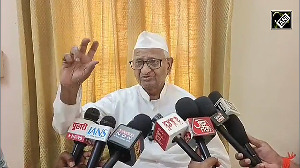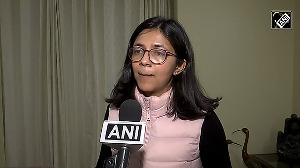The Bush administration had resigned itself to the departure from power of its trusted ally Pakistan President Pervez Musharraf.
Sources told rediff.com the administration has told the Pakistan government that Musharraf is "not to be humiliated." If he decides to stay in Pakistan or leave the country, he and his family are to be treated with respect and guaranteed safety, or assured safe passage.
One source told rediff.com that the last thing the administration needs is Musharraf being humiliated and fleeing the country the way the Shah of Iran, who was also a friend of the US, left Tehran after the Islamic Revolution of February 1979. The Shah traveled from country to country before he died in Cairo, after fleeing Panama -- where he was expecting to live out his last months -- after Washington denied him asylum.
According to sources, senior State Department and White House officials, including Anne Patterson, the ambassador to Pakistan, keep in touch with officials in the Pakistan government and army, including army chief General Ashfaq Kiyani. They had made it clear that Washington expects Musharraf to not only be spared any humiliation but guaranteed safety in Pakistan if he decides to remain in the country.
But the sources said there was no discussion regarding asylum for Musharraf if he decides to leave Pakistan, either in the US or Saudi Arabia. They also dismissed speculation in the Pakistani media that Musharraf has been trying to call President George W Bush, but that the latter has ignored those calls.
The conservative Heritage Foundation said Musharraf's exit could help end 'months of political paralysis in the country and stabilise the new civilian government.'
'The US should stay as removed as possible from the political machinations in Pakistan while urging all sides to find a peaceful resolution to the political crisis that strengthens the democratic institutions of the country and prevents a return to military rule,' it said.
While acknowledging that 'Musharraf's fate and the future direction of Pakistan is largely in the hands of the Chief of Army Staff General Kiyani,' the think tank warned General Kiyani against deciding 'to support dissolution of the new Parliament and the reassertion of army control over the government.'
The Heritage analysis, written by its senior research fellow for South Asia, Lisa Curtis, argued that such a move by General Kiyani 'would be highly unpopular within the Pakistani public and would likely result in potentially violent street protests.'
An alternative scenario, which would make more sense, the Foundation suggested, was for General Kiyani 'to prevail on Musharraf to make a graceful exit that would allow for the installation of a new president that would be less likely to cause friction within the system and would allow the army to remain outside the political fray,' and give its full attention to the 'real threat to the country's future: The advance of Taliban militants along the border with Afghanistan and in some of the settled areas on the North West Frontier Province.'






 © 2025
© 2025